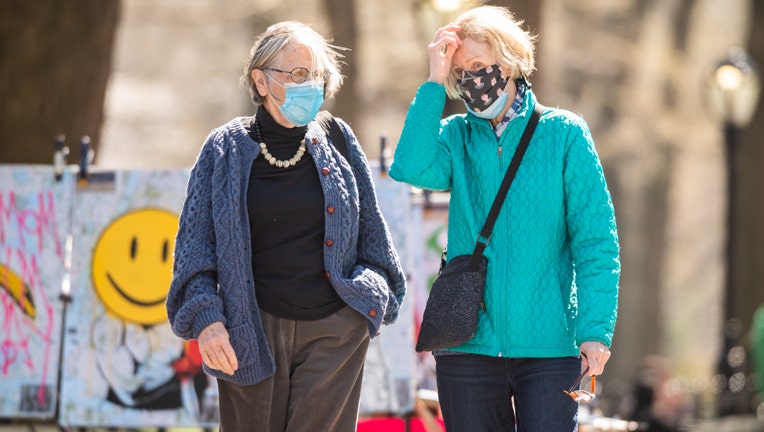Near-universal mask use could save 14,000 lives from COVID-19 in US by August, according to model

People walk in Central Park amid the coronavirus pandemic on March 30, 2021 in New York City. (Photo by Noam Galai/Getty Images)
SEATTLE - A new model suggests that if 95% of Americans wear a mask, 14,000 lives could be saved over the summer from COVID-19 in the United States.
The University of Washington Institute for Health Metrics and Evaluation updated its COVID-19 projections last week. Right now, researchers project that the country’s COVID-19 death toll could reach 618,523 by Aug 1. However, with nearly universal mask use, that number is predicted to go as low as 604,403 deaths.
According to Johns Hopkins, more than 562,000 Americans have died from the coronavirus since the pandemic began in March 2020. It’s the highest death toll in the world, according to their data.
In the worst-case scenario, the model predicted the country could see 697,573 deaths by August if the country returns to pre-pandemic behaviors. That is even with the model taking into account the rate of vaccinations.
RELATED: NJ server receives almost $2,000 after customer refuses to tip over COVID-19 rules
According to the U.S. Centers for Disease Control and Prevention, more than 72 million Americans have been fully vaccinated, representing 21.9% of the total U.S. population.
However, concerns are growing about COVID-19 variants.
The B.1.1.7 coronavirus variant which was first discovered in the U.K. late last year is now the "most common lineage circulating in the U.S.," CDC Director Dr. Rochelle Walesnky said Wednesday.
"Across the country, we’re hearing reports of clusters associated with daycare centers and youth sports. Hospitals are seeing more and more younger adults, those in their 30s and 40s, admitted with severe disease," Walensky said. "Data suggests this is all happening as we’re seeing increasing prevalence of SARS-CoV-2 variants, with 52 jurisdictions now reporting cases of variants of concern."
RELATED: Georgia site stops Johnson & Johnson vaccinations after adverse reactions
On Wednesday, Walensky also noted that while vaccine rates are steadily increasing across the U.S., so are trends in both case numbers and hospitalization rates.
"These trends are pointing to two clear truths: One, the virus still has hold on us — infecting people and putting them in harm’s way and we need to remain vigilant. And two, we need to continue to accelerate our vaccination efforts and take the individual responsibility to get vaccinated when we can," Walensky said.
In an interview with FOX Television Stations, Dr. Anthony Fauci — the top U.S. infectious disease expert — said last week the protection against any symptomatic infection diminishes by a fair amount when variants are involved.
Even so, the FDA-authorized vaccines from Pfizer, Moderna and Johnson & Johnson still offer solid protection against severe disease, hospitalization and death, he said.
"So what might happen is that when you get these new variants, some of them may not be protected against when you’re talking about mild-to-moderate disease, but at the same time, people are not going to get severely ill and wind up dying," Fauci explained.
RELATED: Fauci says variants are ‘wild card’ in COVID-19 booster vaccine equation
Fauci has previously said vaccines are designed to recognize multiple parts of the coronavirus’ spike protein, making it unlikely a single mutation could be enough to block the vaccine.
But scientists around the world, such as the researchers in Israel, are conducting research with different vaccines to find out.
The Associated Press, Austin Williams and Jordan Smith contributed to this report. This story was reported from Los Angeles.


